Angels and demons. The core of In Nomine. If you’ve ever dreamt of playing one of the Heavenly Host or a Satan spawn from the depths of Hell, this is your game. Even if you haven’t, it’s still worth checking out. In Nomine ranks in the top five of my all-time favorite games.
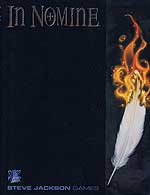 Excuse My French
Excuse My French
In Nomine is based on a French game called In Nomine Satanis/Magna Veritas. But the American version, published by Steve Jackson, is no mere translation of the French game. The folks at SJGames made changes, making the game (according to them) more appealing to an American audience. I’d love to do a From the Basement coverage of the original French game; unfortunately, I haven’t yet been able to get my hands on a copy. If anyone has one they’d like to sell…
God Does Not Does Play Dice With This Universe
One interesting thing about this game is its dice system. Like GURPS it uses d6’s, but that’s where the resemblance ends. In Nomine uses three six-sided dice, one of which should be a different color from the other two. The basic mechanics are straight-forward: roll two sixes and total them. Add in situational modifiers. If the resulting number is lower than the total of the character’s appropriate stat + skill score, you succeed. If it’s higher, you fail.
Then comes an interesting bit — you’re actually rolling all three d6’s. The third die isn’t added into your total — called the check digit, it indicates the degree of success or failure. A low result means a borderline success or failure, a high result means a particularly spectacular success or dismal failure. The GM interprets the check die to describe the results of your character’s actions.
But the fun doesn’t stop there. If you roll a natural result of 111 (a one on all three dice) or 666, things get really interesting. Called an intervention (DI — divine intervention — for short), a roll of 111 means God’s favor smiles upon you. Great if you’re playing an angel; not so good if you’re playing a demon. A roll of 666 means you’ve gained the personal attention of Down There.
Baby, You’ve Got Character
Character creation is simple and very quick. Groups I’ve played with have been able to finish character creation in under an hour, even if they’re new to the game. The steps are as follows:
- Find out from the GM if you’re playing angels or demons. You may be running a mixed party of both, but that works much better for one-shots than for on-going games.
- Choose a Choir (for angels) or Band (for demons). Each Choir/Band has different powers, called resonances. These range from always knowing if someone’s telling the truth (Seraphim, an angelic Choir) to being able to destroy things with your mind (Calabim, a demonic Band).
- Choose a superior — which archangel or demon prince do you serve? Your superior gives you further powers.
- Purchase levels of the three Forces, corresponding to body (Corporeal), mind (Ethereal), and spirit (Celestial). Depending on the type of character you’re playing, you have between five to nine Forces, which you can spread out as you please among the three types.
- The level of your Forces determine your characteristics (stats/attributs) scores. You’ve got six characteristics, two for each type of force: Strength and Agility (Corporeal), Intelligence and Precision (Ethereal), Will and Perception (Celestial).
- Purchase further powers and/or resources from a pool of points. Resources include skills, Songs (like spells), possessions, servants, extra bodies, etc…
Skills are broad and many of a character’s powers are determined by his Choir/Band and Superior. This leaves few choices for the player to make, which has its good points and bad points. On one hand, you can create characters very quickly; on the other hand … well, you have limited choices.
In the Mood
The In Nomine games I’ve played and ran tended to be rather tongue-in-cheek; the game lends itself to a light-hearted mood. But there’s no reason you couldn’t run a serious campaign. Like many games from the 90’s, the setting tends to be dark, even when it’s funny. For one thing, the angels of this game aren’t your fuffy, “sit on white clouds strumming harps” angels. Think Prophecy, rather than Touched by an Angel.
The quick character creation means that this game works as well as a series of one-shots as it does an on-going campaign. Given a fairly straight-forward objective, you can easily run an entire adventure in one evening, including character creation.
That’s All, Folks!
Steve Jackson Games — to the best of my knowledge — isn’t putting any more In Nomine material in print, but there’s been some support in the form of PDF material. You can find these at e23, including an introductory adventure called The Sorcerer’s Impediments. This PDF contains 4 pre-generated characters and all the mechanics you need to run the adventure, allowing you to try the game out for free.
If you’ve played In Nomine, please share your experiences, good and bad.
Just remember:
Angels always do more damage.

 Back in June, I created a town called “Meadowbrook”. This month, I’m sponsoring a contest based on that town. All you have to do is create a NPC — an inhabitant of Meadowbrook — using the information given in this blog. The characters I like best will become part of the “official” Meadowbrook setting. In exchange, every entry you make gives you a chance to win a set of
Back in June, I created a town called “Meadowbrook”. This month, I’m sponsoring a contest based on that town. All you have to do is create a NPC — an inhabitant of Meadowbrook — using the information given in this blog. The characters I like best will become part of the “official” Meadowbrook setting. In exchange, every entry you make gives you a chance to win a set of 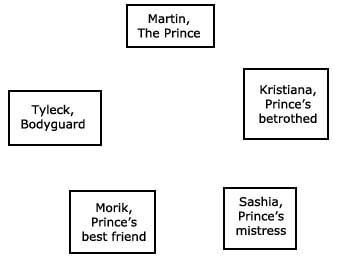
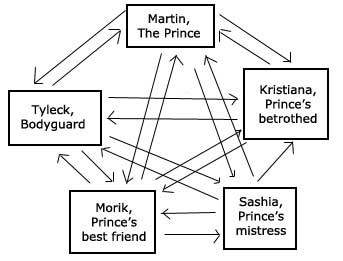 7. Along the arrows, write what each character feels about the others she knows:
7. Along the arrows, write what each character feels about the others she knows: 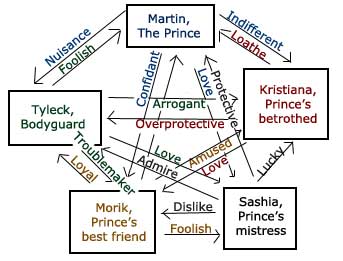
![Reblog this post [with Zemanta]](http://img.zemanta.com/reblog_c.png?x-id=05fa4970-d028-4c9e-ab1c-740e4d4b4624)
 We all get them: the incessant rules lawyer who challenges your every call; the “loopholer” who will exploit everything not nailed down in the rules to gain that extra +1 advantage; the player who takes everything that happens to their character as an attack on themselves…
We all get them: the incessant rules lawyer who challenges your every call; the “loopholer” who will exploit everything not nailed down in the rules to gain that extra +1 advantage; the player who takes everything that happens to their character as an attack on themselves… So with a missing GM, you’re going to have to cancel the game for tonight, right?
So with a missing GM, you’re going to have to cancel the game for tonight, right?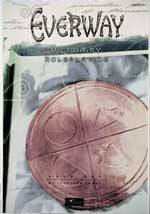 I have to admit, when it came out, I paid little attention to Everway. Everything I read and heard about it seemed to indicate it was a game slanted at new gamers and with 15 years of game experience under my belt at the time, why would I need a beginner’s game? Plus, with it’s box and cards it seemed … well … kitschy. But when our local game store marked their copies down to $3 apiece, I bought a set … just for the collection, of course.
I have to admit, when it came out, I paid little attention to Everway. Everything I read and heard about it seemed to indicate it was a game slanted at new gamers and with 15 years of game experience under my belt at the time, why would I need a beginner’s game? Plus, with it’s box and cards it seemed … well … kitschy. But when our local game store marked their copies down to $3 apiece, I bought a set … just for the collection, of course.



